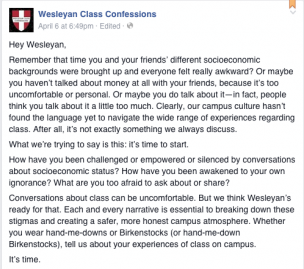A new student group seeks to bring issues of socioeconomic status to the forefront of conversations about inclusion.

c/o Wesleyan Class Confessions
Discussions of class issues on campus are more often than not met with uncomfortable silence. “Wesleyan Class Confessions” has emerged to bring them to the forefront. Using the constant chatter of Facebook as a platform to spark discussion about socioeconomic status, the page was conceived by First Class, a new group spearheaded by Aidan Martinez ’17, Torii Johnson ’17, and Caroline Liu ’18 that aims to foster a more accepting and honest campus environment.
According to Martinez, the lack of discussion surrounding socioeconomic background is one of the University’s main shortcomings and is largely due to the rather inconspicuous nature of economic status.
“Class is not really talked about at all here,” Martinez said. “It’s is one of the biggest identifiers that goes unnoticed because we can’t see class. We can see race easily; you can see gender easily. But you can’t see how much people make or their income.”
According to Martinez, the diminishing presence of middle-income students in the Wesleyan population has also contributed to this condition of silence. As he explained it, middle-class applicants are often not given as much financial aid as they need. This forces them to take out loans; eventually, many find themselves dropping out. Ultimately, this trend has given rise to a more polarized campus environment.
“I think that [the middle income group] was the thing that really solidified our community and made class dialogue a lot easier, but now that you have these two opposing forces [of low-income and high-income students], it makes it hard,” Martinez said.
The economic division of the campus community, Martinez said, has also prevented individuals from expressing themselves genuinely in the University setting. Because many students of lower socioeconomic status feel the need to assimilate to the habits of wealthier students, they often take up habits or activities that differ from the tendencies they exhibit at home.
“At college you have a very specific way that you talk: in class you’re more sophisticated and with your friends you have this different kind of lingo and language,” he said. “But when you go back home, when you talk to your parents, they’re like, ‘Why are you talking to me like that? Stop being so elitist.’”
By seeking to replace this stifling silence with honest discourse, First Class has taken action at the root of the socioeconomic tension they seek to correct. The process of attaining this goal, however, has been impeded by a number of obstacles. Unsurprisingly, these obstacles parallel many of the challenges that have long hindered conversation about such identifiers as race and, more explicitly, sexuality.
A current program called Quest Bridge is intended to promote awareness about socioeconomic status. But it is part of the Quest Scholars Network, a national organization that funds Quest Scholarships.
Liu said this has left many first-generation and low-income students who are not Quest Scholars feeling alienated.
“A problem that I noticed [with Quest Bridge] this year as a freshman was that a lot of my friends who did come from first-generation or low-income backgrounds didn’t really feel comfortable going to Quest Bridge events, because they were not Quest Scholars—they did not get Quest Scholarships,” Liu said. “And, even though they fit that identity, it was weird [for them] being represented by an organization they were not a part of.”
Still, Liu said, First Class supports Quest Bridge.
“First Class was really born out of being an inclusive umbrella for people of [first-generation and low-income] identities on this campus,” she said. “Function-wise, we are working in tandem with Quest Bridge.”
According to Martinez, the process of promoting conversation about socioeconomic background will inevitably involve self-acceptance on the part of all individuals, whether wealthy, low-income, or otherwise. “Wesleyan Class Confessions,” First Class’s first project, provides, in his eyes, the ideal environment to foster this class-oriented “coming out” process.
“The Class Confessions page was our first big project to get [First Class’s] name out there, and we think that by advertising ourselves through this page, people will start showing up to our meetings and start, you know, for lack of a better word, ‘coming out’ with their status and getting people to talk about class,” Martinez said.
In its early stages, First Class already appears to be moving swiftly towards its goal. Approaching 600 page “Likes,” “Wesleyan Class Confessions” has served as an expressive outlet primarily for low-income and first-generation students. Many upper and middle-income students have also utilized the space to support and clarify any misconceptions about their own socioeconomic communities.
The group has further gained a solid foundation through its previous Orientation activities and monthly meetings, as well as through a new WesFest event. This success is the product of a collaborative effort and has motivated the First Class team to plan future projects.
“Since we got the first-generation scholarship, I’m trying to figure out how to get more low-income scholarships and scholarships for textbooks funded by alumni,” he said. “[Liu] is also working on setting up monthly workshops for low-income students on how to do taxes, how to do FAFSA, and how to networks. [Johnson] is really trying to rebrand how Quest Scholars looks. She’s good at reaching out to people and I think that she’s the one between [Liu] and [me] that provides most intersection between groups on campus.”
Martinez emphasized the importance of listening to other people’s experiences, especially when those experiences have been radically different than one’s own.
“I encourage people to look at the page with an open mind,” Martinez said. “They will take a lot more away than they know just by scrolling through it. Everybody has something to work on, and I think that this page shows what we need to work on the most.”
Comments are closed